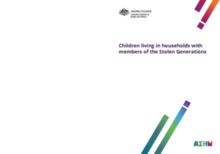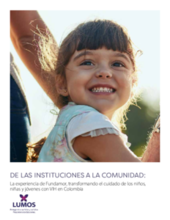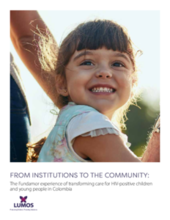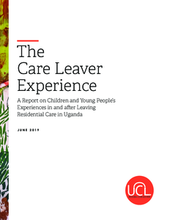Displaying 441 - 450 of 1508
This study explored the social images of families of children and youths in residential care in a sample of 176 participants with and without professional contact with this population.
This report presents analyses of selected outcomes for Aboriginal and Torres Strait Islander children who live in households with members of the Stolen Generations.
Este informe documenta el proceso de la organización Fundamor a cerrar su internado y, con el apoyo de Lumos, reubicar a los niños y niñas internos en nuevas modalidades de atención familiar.
This report documents Fundamor's process of closing its institution in Colombia and moving children to family-based care, drawing out successes and challenges.
This study aimed at investigating specifically whether institutionalization impacts negatively children’s psychological adjustment defined in terms of externalizing behavior, internalizing behavior and self-esteem and whether having living parents has additional influence. Ninety-five institutionalized and 82 not institutionalized children in Rwanda, aged 9 to 16, participated in the study.
“Current Aftercare Practices” (CAP) is a documentation exercise designed to look at the support and services received by CLs from the objective lens of an ‘Aftercare Quality Index’(AQI), calculated using the scores within 8 domains. This report covers a total of 98 young adults from Rajasthan, comprising of 40 males and 58 females CLs, from both Government and NGO-run Child Care Institutions (CCIs) and 17 youth who, as children, availed the benefits under the Palanhar scheme of the Rajasthan Government.
A descriptive study was undertaken to assess self-esteem and its associated factors among adolescents living in orphanage and with parents at home in a selected orphanage and community, West Bengal with the objectives to assess level of self-esteem among adolescents living in orphanage and in home and to find out the associated factors related to self-esteem.
In order to address the need for evidence-based research about the care leaver experience, a study was facilitated by the Uganda Care Leavers project - sponsored by Alternative Care Initiatives (ACI), a Ugandan NGO, and BULA, a U.S. 501(c)(3) non-profit organization - to conduct peer-led participatory workshops throughout the country. These care leavers, identified by local community leaders and networks, were invited to participate in workshops where they completed surveys about their experiences, the results of which are presented in this report. Survey results are the basis of this study’s recommendations and suggestions for future care reform.
This paper presents the current vulnerabilities faced by children and the scenario of child protection in India. While discussing the legal provisions prevailing in the country, it sheds light on the socio-cultural barriers that are creating resistance within the society in making the Alternative Care model (and the process of deinstitutionalisation of children) a success. Lastly it suggests viable options that may be helpful for the same.
The goal of this research was to challenge or validate the assumptions that underpin existing impact and change focused solutions; to combat the complete dearth of data and lack of meaningful information available in the sector about the longer term effects of institutional care on children in India; and to enable programmes both within and outside of Make A Difference to be designed on the back of benchmarked and trackable outcomes.








